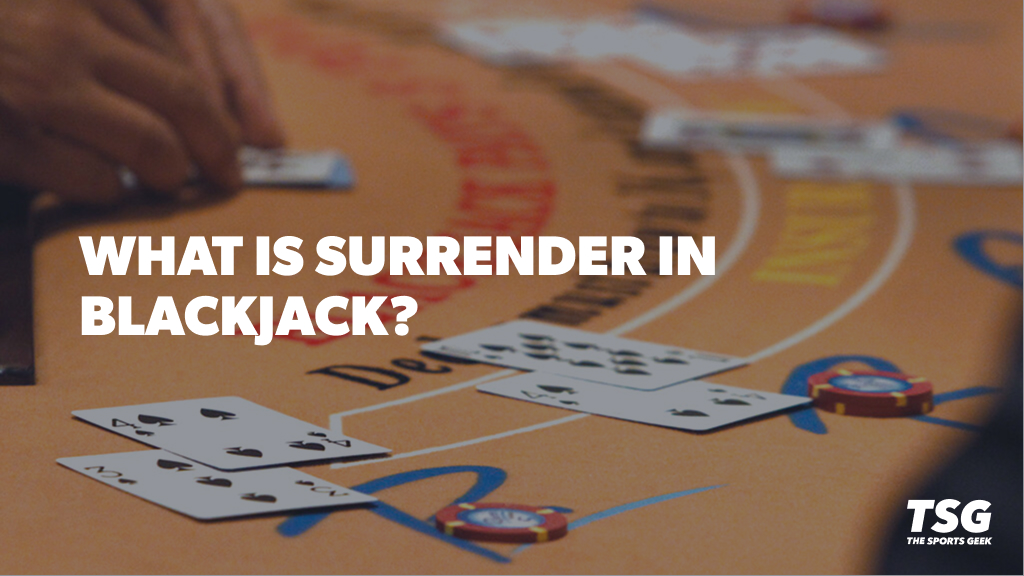
The blackjack surrender option can reduce the house edge when used correctly by giving players an out if their hand is too weak to pursue. However, knowing when and how to use the surrender option can take some practice.
In this guide, I will explain how surrender works in blackjack, when to use it, and demonstrate the pros and cons of this feature.
What is Surrender in Blackjack?
Surrender in blackjack is an option that lets you give up your hand early and get half of your original bet back. You don’t play the hand any further, and the dealer takes your cards. The feature is usually available before you take any actions, such as hitting, standing, doubling, or splitting.
It can be a great tool for players at the best blackjack sites and live casinos when used correctly, because it can improve your expected returns.
There are two types of surrender: early and late, so let’s talk in more detail about them next.
What is Early Surrender in Blackjack?
In early blackjack surrender, you can forfeit your hand before the dealer checks for blackjack. So, even if the dealer has blackjack, you can still save half of your stake. It is a great option if the dealer is showing an ace or a 10.
Early surrender in 21 is rare nowadays, because it gives competent players a big edge.
What is Late Surrender in Blackjack?
On late blackjack surrender tables, you cannot surrender your hand until after the dealer checks for blackjack. If the dealer has blackjack, you lose the hand without being able to take advantage of the surrender option.
When the dealer does not have blackjack, they will offer you the chance to surrender. By definition, they will have either an Ace or a 10 showing. So, if you have a weak starting hand, it could be a good time to surrender and save half of your stake.
Surrender vs. Insurance: What is Better?
Insurance is a similar option to surrendering in blackjack, as both are designed to protect the player against a strong dealer’s hand. However, it’s essentially a side bet, so you need to put extra money in there to use the insurance feature.
Insurance bets are only available when the dealer’s up card is an ace, and you win the side bet if the dealer has blackjack. However, you still lose your initial stake since the dealer wins the hand.
Early surrendering is most like insurance as both options are available before the dealer checks for blackjack. However, since insurance is a side bet, you must wager additional money on it. If you are wrong, you could lose your initial wager and your insurance stake.
That’s why you shouldn’t use the insurance option. Surrendering is not that simple and sometimes favors you, so let’s talk about the pros and cons before I explain when you need to use it.
Pros of Surrendering in Blackjack
Knowing when to surrender in blackjack can create unique advantages for the player. Here are the main benefits of using this feature.
Cons of Surrendering in Blackjack
There is no perfect blackjack strategy, and surrendering has some drawbacks. Here are some cons to surrendering in blackjack.
When to Surrender in Blackjack?
You should surrender in blackjack when the odds of winning a hand are under 50%. In any other case, you shouldn’t do it. That’s the principle, but let’s go through specific examples.
Here are the situations when you should use the late surrender in blackjack because it reduces the house edge:
- You have a hard 16, and the dealer is showing a 9 or higher
- You have a hard 15, and the dealer is showing a 10 or an ace
Knowing when to forfeit when early surrender is available is more complicated. Here are the situations when you should take advantage of the early surrender.
| Your Hand | Dealer’s Hand |
|---|---|
| Hard 5-7 | Showing Ace |
| Hard 12-17 | Showing Ace |
| Pair of 3s, 6s, 7s, or 8s | Showing Ace |
| Hard 14-16 | Showing 10 |
| Pair of 7s or 8s | Showing 10 |
Advanced players should also consider the number of decks being used. For instance, you should not use early surrender if you have a five and a nine against a 10 in a single-deck game. However, you would surrender this hand early in a double-deck game.
Other exceptions for early surrendering include:
- Do not early surrender a four and a 10 against a 10 in single or double-deck games
- Do not use early surrender for a pair of eights against a 10 in a single-deck game if you can double after splitting
- If the dealer can hit on soft 17, surrender a pair of twos against an ace
Now that you know the ins and outs of surrendering in blackjack, you can put your skills to the test. We recommend BetUS because it offers a wide variety of blackjack games, including online blackjack tournaments, and has exciting promos exclusively for blackjack players.






You must be logged in to comment. Don't have an account? Sign up today.